One of the several cannabinoids in the cannabis plant is cannabidiol or CBD. Although CBD shares many characteristics with the most well-known cannabinoid, THC, it has no psychoactive compound. This indicates that it does not cause the person to feel intoxicated.
“How long does CBD stay in my system?” is the most frequently asked question of people using CBD products. While CBD has been around since the 1940s, there’s no direct answer for this. Each person’s experience with CBD will be different, as will the duration of its effects and how long CBD remains detectable.
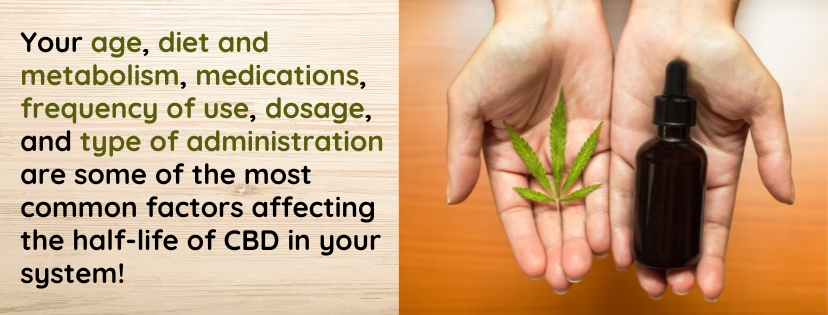
Popular Studies on the Metabolism of CBD
There isn’t much research on how long CBD oil lingers in a user’s system, as already noted. The most significant study conducted to date is shown below.
A study published in 1991 examined the CBD levels of participants who administered high doses of CBD daily. The study included 14 patients with Huntington’s disease that received a daily dose of 700 mg of CBD substance. The research group concluded that CBD levels were “virtually undetectable” after seeing only 1.5 ng/mL of CBD one week after the trial.
Another popular study is the double-blind and placebo-controlled crossover design. This study had 24 volunteers aged 18-45 years old. Participants received soft-gel capsules containing 10 mg of THC (THC-set), 10 mg of THC plus 5.4 mg of CBD (CAN-set), or a placebo once a week. Low levels of CBD—1.35 mg taken with 2.5 mg of THC—disappear from the body nine hours after ingestion.
The expected half-life of CBD from CBD oil was determined to be 2–5 days for everyday users, according to a 2018 assessment of previous CBD studies. Different administration techniques resulted in different half-lives.
CBD Half-Life
In medicine, the half-life of a substance is a widely used measurement that aids researchers in estimating how long it takes for an individual to eliminate half of the initial dose of a chemical from their body.
Assuming you took 10 mg of CBD, the CBD will reach the peak of your blood levels one hour after administration. Only 5 mg of CBD will be left in your blood during the first half-time (3 hours). During the third half-time (6 hours), the body will contain 2.5 mg of CBD. In the fourth half-time (9 hours), only 1.25 mg of the 10 mg CBD will circulate in your body. After 12 hours, your body will only have .62 mg of CBD.
Then again, remember that this may not apply to everyone. Several factors will affect how your body metabolizes CBD substances, such as how you consume CBD.
Factors Affecting the Duration of CBD in Your System
How long CBD stays in your system depends on several factors. Although some factors may have a considerably more significant impact than others, all of them will have some impact on how CBD is metabolized and eliminated from the body.
Method of CBD Administration
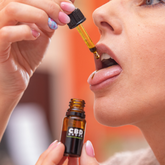
CBD’s intensity and staying power are also affected by how you take it. There are numerous formats available for CBD. Most popular goods include CBD oil, CBD edibles, CBD vapes, CBD capsules, CBD topicals, and CBD vapes.
Bioavailability and consumption strategy go hand in one. In general, delivery techniques with higher bioavailability will also leave your system more quickly.
Additionally, consuming CBD on an empty stomach allows the component to leave your body more quickly. Consuming CBD on full stomach results in slower absorption and metabolization.
Age
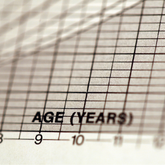
How long CBD stays in your system will also depend on your age. Our bodies’ and minds’ processes start slowing down as we age. Younger people tend to have significantly more active metabolisms, which makes them much better at eliminating CBD from the body.
Metabolism
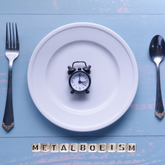
Metabolism is one of the most critical aspects of the processing and eliminating CBD substances from the body. CBD will stay longer in people who have slower general metabolisms.
Frequency of Use
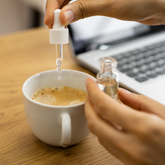
An individual’s frequency of use is among the most crucial variables in determining how long CBD is maintained in the body. If you use CBD regularly, your body will not have enough time to absorb the prior doses. Because of this, CBD medicine accumulates in the body over time, ultimately taking longer to eradicate completely.
Dosage
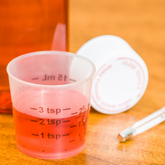
Higher doses are more challenging for the body to process and eliminate quickly. Lower-dose users can anticipate the CBD leaving their systems more rapidly on average.
Body Mass Index
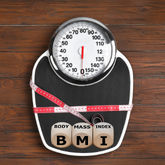
How long CBD will stay in your system depends on your BMI. Since almost all cannabinoids are fat/oil soluble, they can easily be stored in fat cells after consumption. Because of this, individuals with greater BMIs tend to keep cannabinoids in their system for an extended period of time.
Diet

The length of time CBD remains in the system can be indirectly influenced by diet. A fit person can absorb CBD faster because having a well-balanced diet aids in the breakdown of CBD through the body’s natural metabolic process.
How Long Do the Effects of CBD Last?
Vaporized CBD
Smoke CBD provides the highest bioavailability of all CBD formats, with up to 56% of inhaled CBD entering your system.
When you take a puff from your CBD vape pen or inhale the vapor from a high-CBD flower, the active ingredients enter the bloodstream using the lung tissue. Smoking CBD usually takes effect 5 minutes after inhalation. On the other hand, they provide the shortest duration of all consumption methods; vaporized CBD will last up to 3 hours.
Sublingual CBD
Taking CBD sublingually allows the components to travel via the tiny capillaries under the tongue and into the circulation, making it a relatively effective way of ingestion. CBD can evade the first-pass metabolism in the liver because of this intricate network of blood arteries.
The effects of sublingual consumption start to take action 15 to 20 minutes after ingestion and last for 4 to 6 hours. The percentage of CBD oil that eventually enters the bloodstream, or bioavailability, is 35%.
Oral CBD
CBDs that are consumed orally are the most favored way of CBD administration. A pretty efficient way to enjoy the advantages of this cannabinoid is by taking a capsule or eating CBD gummies. However, oral ingestion or chronic oral administration also takes the longest for CBD to start working.
As the product is swallowed, the CBD undergoes gut metabolization before entering the bloodstream. Depending on your metabolism and whether you ate before taking the CBD, reaching your endocannabinoid system may take 30 to 90 minutes.
Capsules have the lowest bioavailability. It’s popular among users who like to take their CBD on the move. However, only 20% of CBD ingested makes it into your blood.
The benefits remain longer than with oils — up to 10 hours — due to the steady release of CBD into the endocannabinoid system as a result of the delayed onset. CBD oils are also best used as an anti-inflammatory.
Topical CBD
Topical CBD products are best for people who want to treat localized issues like irritability and discomfort. The CB2 receptors are found in the epidermal layer of the skin, where CBD can be applied topically. Activating these receptors has a variety of advantages for the health of the skin.
Athletes and gym rats often use topical CBDs because this form enhances post-workout recovery and has better therapeutic effects.
However, different formulae of CBD topicals have different rates of absorption. Review the ingredient list and search for the specific fats and oils that served as the product’s foundation. It’s best to buy CBD from trusted vendors and brands.
CBD and Drug Tests
Many people asking how long CBD is detectable in the human body are concerned about passing a drug test. Well, you’ll be happy to know that CDB does not appear on a drug test at all! Why? Because drug tests, may it be urine or blood test, don’t screen CBD components since CBDs are not intoxicating, especially not a controlled substance.
No matter how recently you administered CBD, you’ll pass the drug test unless the product you ingested contains delta-9-tetrahydrocannabinol (THC).
Full-spectrum CBD, which contains all the naturally occurring compounds in a hemp plant, may cause a positive drug test. Use CBD isolate or broad-spectrum CBD products if this worries you. No THC is often present in broad-spectrum CBD.
THC may linger in your urine for several weeks up to a month after using a full-spectrum CBD product, so be prepared. Given that THC and CBD can accumulate in your fat cells, the frequency and duration of THC or CBD use will determine how long a substance is detected in urine tests.
Your body usually gets rid of a single use in three days. Taking a dose every few days will allow the component to stay in your system for about 10 to 21 days. If you take it daily, it will remain in your system for a month after the previous dose. Keep in mind that every time you consume THC, the clock resets.
Flushing Out CBD in Your System
There are several ways to flush out CBD in your system. But the best and most effective way to do so is to stop administering CBD products! You should be CBD-free in two to three weeks if you allow your body’s natural cleansing processes to do their thing.
To eliminate traces of CBD in your body, you can do the following:
- Drink plenty of water
- Try diuretics
- Eat foods rich in fiber
- Avoid any high-fat meal
- Exercise
Sometimes, time is not in your favor, and you must cleanse your body from all the CBD products you consume ASAP. You could be tempted to use detox tablets in such situations. These drugs aid in the body’s quick removal of chemicals.
Before taking any detox pills, you should be aware of their potential adverse effects. Vomiting, stomach cramps, diarrhea, nausea, excessive perspiration, headaches, and muscle spasms are some significant negative effects of detox pills. Always use trusted brands.
